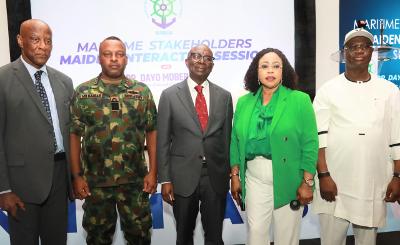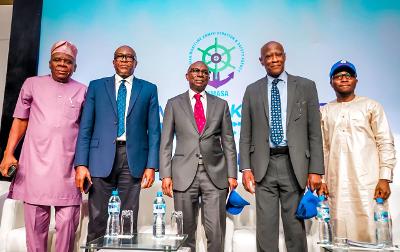The Nigerian Maritime Administration and Safety Agency, NIMASA, has assured stakeholders of inclusivity, towards the development of the sector.
The NIMASA Director General, Dayo Mobereola made the disclosure during an interactive session with maritime stakeholders in Lagos state southwest Nigeria.
 He noted that President Bola Ahmed Tinubu through the Federal Ministry of Marine and Blue Economy is urging stakeholders to partner with the Government in developing the sector.
He noted that President Bola Ahmed Tinubu through the Federal Ministry of Marine and Blue Economy is urging stakeholders to partner with the Government in developing the sector.
According to him, it is important that we develop clear objectives, goals, and strategies to advance the industry and align with the vision of the President of the Federal Republic of Nigeria and the Minister of Marine and Blue Economy.
“While the Agency will continue to play its part in serving the industry, it is important that we all collaborate to achieve a sustainable maritime sector, as all efforts should be inclusive and collective.”
The Director General reassured shipowners that the Agency is committed to expediting the automation of the ship registry, a move that will significantly boost shipping development in Nigeria by enhancing efficiency and streamlining processes.
In his welcome address, a former Nigerian Minister of Interior and chairman of the occasion, Captain Emmanuel Iheanacho expressed the industry’s delight at the appointment of Mobereola, whom he described as a seasoned and accomplished maritime professional.
He noted that Mobereola’s extensive experience and expertise will be invaluable in driving the administration and development of the Nigerian maritime industry forward.
Iheanacho expressed optimism that under the current leadership of the Agency, Nigeria would make significant strides in promoting ship safety, shipping development, maritime security, and environmental sustainability in our waters.
He noted that Mobereola’s dedication to capacity building will undoubtedly position Nigeria as a key player in the global maritime industry.
He added that stakeholders are willing to collaborate with the DG to move the sector forward.
“We expect the DG to be fully aware of the impact of technological developments in the Marine and Blue Economy industry, to guide in the formulation of policies to be developed. We look forward to working together with you to address the challenges ahead and to seize the opportunities that lie before us. I
I acknowledged the hard work, resilience and determination of past Directors-General and other stakeholders who were present, noting that their commitments contributed to the robust framework from which the Agency and the maritime industry at large are benefiting,” Iheanacho said.
In his presentation titled; “Marine and Blue Economy: Navigating to the Promised Land,”a maritime lawyer, Emaka Akabogu proposed various reforms including policy and agenda verification, enhanced data and technology utilization, minimum industry standards, deliberate recruitment of professionals, empowerment protocols, development of standard shipping development courses, and accountability measures for NIMASA and the industry as a whole.
He emphasized the need for routine meetings based on clear identifiable milestones to drive accountability and progress for the sector.
For her part, the President of the Seaport Terminal Operators Association of Nigeria (STOAN), Princess Vicky Haastrip emphasized the critical importance of dockworkers in the industry.
“Where there are no dockworkers, there are no ships”, she said. Therefore, the training of dockworkers is very critical.” Haastrup said.
The President General of the Nigerian Maritime Workers Union (MWUN), Comrade Adewale Aseyanju who supported Haastrup’s position, emphasized the importance of continually training dockworkers and ensuring a decent work agenda, in line with the Maritime Labour Convention (MLC) 2006.
Aminu Umar, who spoke on behalf of the Ship Owners Association of Nigeria, emphasized the need for further discussions and interactions regarding the International advancements in the maritime industry.
He urged the Director-General to consider the independence of the Ship Registry as observed in other maritime countries.
The various women’s associations in the industry; WISTA, WIMOWCA, WILAT, who were represented by Mrs. Tosan Emore-Edodo advocated for increased participation of women in the industry and called for support in promoting advocacy efforts.

